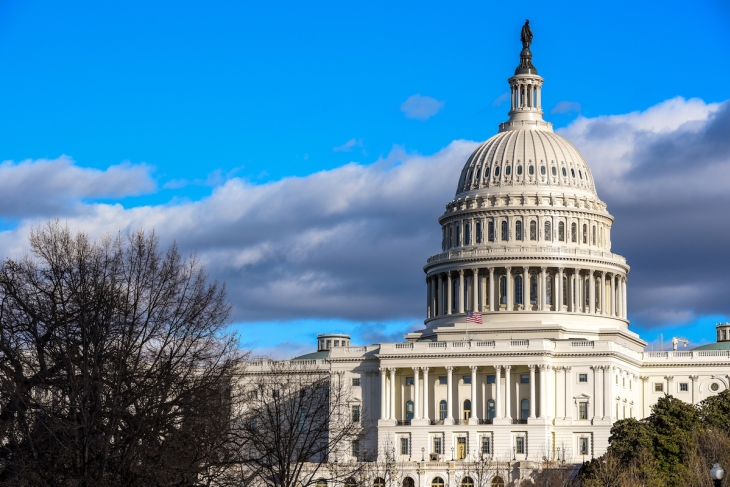In some circles, education research has a bad reputation. All too often, policymakers ignore or weaponize education research findings, while many practitioners consider education research to be “irrelevant.”
But education research is valuable, and smart investments by the federal government in education R & D can produce dividends. Through the federal Education Innovation and Research (EIR) program, promising innovations that make a real difference in student achievement are receiving the support they need to scale up and reach more kids. Meanwhile, federal Small Business Innovation Grants (SBIR) offered by the U.S. Department of Education and the National Science Foundation provide critical financial support to develop new education technologies that help teachers improve their instructional practice and students advance their learning.
Right now, a meager fraction of the U.S. Department of Education’s budget goes to education R & D. In 2021, the department spent an estimated $322 million on it, less than 0.2 percent of the agency’s total budget. This stands in stark contrast to federal investments in other sectors. From 2000 to 2020, federal spending on health R & D increased by 125 percent, but only rose by 39 percent in education, lagging behind the overall inflation rate of 50 percent. Given the need for innovation in K–12 schooling—to improve outcomes for kids and strengthen U.S. competitiveness—the amount dedicated to education research must increase significantly.
Education R & D is a high-yield investment and should therefore be considered as Congress approaches its appropriations process. Put simply, it’s is good for students and the economy.
Let’s look at some examples of education R & D paying off for students, such as successful interventions like the ASSISTments program or Johns Hopkins’s Diplomas Now early warning system. Both have been able to increase learning outcomes for more students thanks to the EIR program.
ASSISTments is an online formative assessment tool that more high-need middle school math students were able to access due to an EIR grant. As a result of this investment from the federal government, more kids are benefitting from an intervention that produces a 75 percent increase in learning in two years.
Similarly, the Diplomas Now program expanded significantly courtesy of an EIR grant (when it was called Investing in Innovation, or i3). It has radically improved high school graduation rates by instituting early warning systems that track and respond to indicators, such as sixth and ninth graders’ attendance and math and English proficiency, to prevent students from dropping out. A recent article in the Washington Post cited this early warning system as one of the key reasons why Alabama and West Virginia’s high school graduation rates have skyrocketed over the last decade.
Beyond success in the classroom, federal investments in education R & D are making a positive impact on the economy. SBIR has spurred the development of numerous commercial ed tech tools and platforms that benefit kids, teachers, and the economy.
A few months ago, publishing giant Scholastic acquired Learning Ovations, an ed tech startup that had been funded by SBIR and EIR. These federal dollars seeded an “assessment to instruction” system that facilitates literacy screening, progress monitoring, and instructional planning—all of which are beneficial to students. An added bonus is that this grant led to a significant acquisition, which does good for the economy at large.
Other SBIR-funded technology are the Moby.Read app by Analytic Measures, Muzology, and Prisms of Reality, Inc. Moby-Read is self-administered literacy assessment for students in grades K–5 that saves teachers the time of having to conduct individual student assessments. In April 2022, Google acquired the IP rights and announced its intention to integrate the app within its existing suite of educational products. Muzology is an award-winning learning platform, grounded in psychology and music, that engages students as they learn math. Students who used it during the pandemic increased their math proficiency by two years, while other students fell behind. And Prisms of Reality, Inc. used the funding to create an immersive virtual reality platform that teaches math and physics, and is tailored for students from historically underserved populations. The platform includes modules such as “Pandemic: How Can We Save Our City’s Hospitals?” to provide students with relevant and tangible learning experiences.
To be sure, not all education research has been valued by educators and education policymakers, and the field sometimes has methodological issues. One researcher found, for instance, that most education studies have very low sample sizes, which limit generalizability.
Still, education R & D holds great promise, and when the federal government funds it thoughtfully, the return on investment is high, with positive results showing up in classrooms and the marketplace. For its part, Congress has continued to take steps to increase support for education research, having recently directed the Institute of Education Sciences to use a portion of a funding increase to support quick-turnaround, high-reward scalable solutions intended to significantly improve outcomes for students. Indeed, federal support for education R & D might be one of those rare areas of bipartisan agreement. Congress would be wise to increase funding further.


